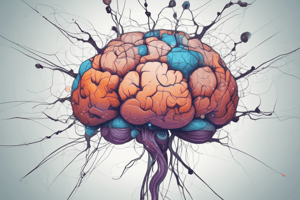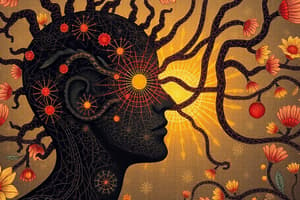Podcast
Questions and Answers
What is the main function of Acetylcholine in muscle contraction?
What is the main function of Acetylcholine in muscle contraction?
- Regulating muscle tone
- Regulating blood pressure
- Stimulating muscle contraction (correct)
- Inhibiting muscle contraction
What is the role of Serotonin in pain modulation?
What is the role of Serotonin in pain modulation?
- Reduces pain (correct)
- Regulates mood
- Increases pain
- Regulates appetite
Which neurotransmitter is involved in the 'fight or flight' response?
Which neurotransmitter is involved in the 'fight or flight' response?
- GABA
- Serotonin
- Dopamine
- Noradrenaline (correct)
Which receptor is involved in the regulation of the autonomic nervous system (ANS) by Acetylcholine?
Which receptor is involved in the regulation of the autonomic nervous system (ANS) by Acetylcholine?
What is the main function of GABA?
What is the main function of GABA?
What is the role of Dopamine in learning and memory?
What is the role of Dopamine in learning and memory?
Which neurotransmitter is involved in mood regulation and appetite?
Which neurotransmitter is involved in mood regulation and appetite?
What is the function of Acetylcholine in REM sleep and dreaming?
What is the function of Acetylcholine in REM sleep and dreaming?
Flashcards are hidden until you start studying
Study Notes
Neurotransmitters
Acetylcholine (ACh)
- Involved in:
- Muscle contraction and relaxation
- Regulation of the autonomic nervous system (ANS)
- Memory formation and learning
- Functions:
- Excitatory neurotransmitter
- Stimulates muscle contraction
- Involved in REM sleep and dreaming
- Receptors:
- Nicotinic receptors (found in the CNS and PNS)
- Muscarinic receptors (found in the PNS)
Dopamine
- Involved in:
- Motor control and coordination
- Reward and pleasure
- Mood regulation
- Motivation and attention
- Functions:
- Inhibitory neurotransmitter
- Regulates movement and balance
- Involved in learning and memory
- Plays a role in addiction
- Receptors:
- D1-like receptors (excitatory)
- D2-like receptors (inhibitory)
Serotonin (5-HT)
- Involved in:
- Mood regulation
- Appetite and sleep
- Pain modulation
- Inflammation
- Functions:
- Inhibitory neurotransmitter
- Regulates mood and emotional state
- Involved in appetite and sleep regulation
- Reduces pain and inflammation
- Receptors:
- 5-HT1 receptors (autoreceptors)
- 5-HT2 receptors (postsynaptic receptors)
GABA (Gamma-Aminobutyric Acid)
- Involved in:
- Inhibitory neurotransmission
- Anxiety and fear regulation
- Sleep and relaxation
- Muscle tone regulation
- Functions:
- Inhibitory neurotransmitter
- Reduces neuronal excitability
- Calms and relaxes the body
- Regulates muscle tone
- Receptors:
- GABAA receptors (fast-acting)
- GABAB receptors (slow-acting)
Noradrenaline (Norepinephrine)
- Involved in:
- Attention and arousal
- Stress response
- Regulation of blood pressure
- Mood regulation
- Functions:
- Excitatory neurotransmitter
- Increases alertness and attention
- Involved in the "fight or flight" response
- Regulates blood pressure and heart rate
- Receptors:
- Alpha receptors (excitatory)
- Beta receptors (inhibitory)
Neurotransmitters
Acetylcholine (ACh)
- Regulates muscle contraction and relaxation, as well as the autonomic nervous system (ANS)
- Plays a key role in memory formation and learning
- Functions as an excitatory neurotransmitter, stimulating muscle contraction
- Involved in REM sleep and dreaming
- Binds to nicotinic receptors (found in the CNS and PNS) and muscarinic receptors (found in the PNS)
Dopamine
- Regulates motor control and coordination, as well as reward and pleasure
- Involved in mood regulation, motivation, and attention
- Functions as an inhibitory neurotransmitter, regulating movement and balance
- Plays a role in learning and memory, and is involved in addiction
- Binds to D1-like receptors (excitatory) and D2-like receptors (inhibitory)
Serotonin (5-HT)
- Regulates mood, appetite, and sleep, as well as pain modulation and inflammation
- Functions as an inhibitory neurotransmitter, regulating emotional state
- Involved in appetite and sleep regulation, reducing pain and inflammation
- Binds to 5-HT1 receptors (autoreceptors) and 5-HT2 receptors (postsynaptic receptors)
GABA (Gamma-Aminobutyric Acid)
- Involved in inhibitory neurotransmission, anxiety and fear regulation, and sleep and relaxation
- Regulates muscle tone and reduces neuronal excitability
- Functions as an inhibitory neurotransmitter, calming and relaxing the body
- Binds to GABAA receptors (fast-acting) and GABAB receptors (slow-acting)
Noradrenaline (Norepinephrine)
- Involved in attention and arousal, stress response, and regulation of blood pressure and mood
- Functions as an excitatory neurotransmitter, increasing alertness and attention
- Involved in the "fight or flight" response, regulating blood pressure and heart rate
- Binds to alpha receptors (excitatory) and beta receptors (inhibitory)
Studying That Suits You
Use AI to generate personalized quizzes and flashcards to suit your learning preferences.




